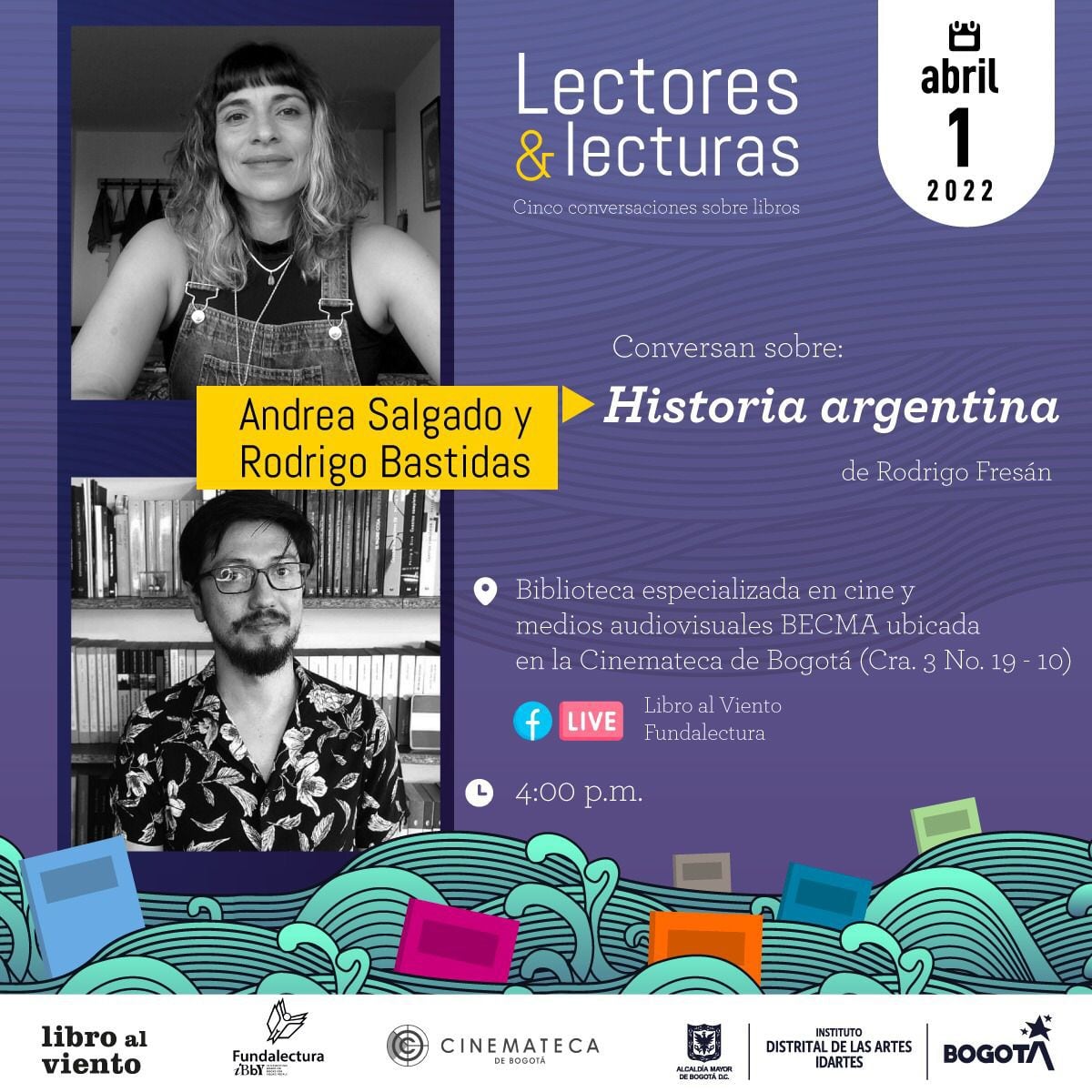
Since the face-to-face events returned to the city, the Cinematheque has arranged for its visitors a series of conferences, talks and films that promise to contribute widely to the cultural development of Bogotá in 2022. On its website, month by month, you can see which films will be presented and which characters will be invited to talk about various topics, all framed in the cinema, of course. Today, for example, you will be able to see films such as “Parallel Mothers”, the most recent film by Pedro Almódovar, “Drive my car”, directed by Japanese Ryusuke Hamaguchi, “Scars on the earth” by Colombian Gustavo Fernández, “Between fire and water”, also Colombian film directed by Viviana Gómez and Anton Wenzel, and “Suddenly , paradise”, by Elia Suleiman, among others.
From 4:00pm, at the Library Specialized in Film and Audiovisual Media (BECMA), inside the Cinematheque, you will be able to appreciate the conversation around the book “Argentine History”, by the writer Rodrigo Fresán. The discussion will also be transmitted through Facebook Live, in the accounts of Libro al Viento and Fundalectura; for admission in person it will be necessary to have a complete vaccination scheme and the capacity will be controlled until the entire space is occupied.

Rodrigo Bastidas, editor of the Vestigio label, spoke exclusively to Infobae:
“Initially, we were going to talk about The Speed of Things, but later I decided that it would be about Argentine History, which is Rodrigo Fresán's first book. It is published in 1991. It was one of the founding texts of an entire Argentine movement that was built on the figure of the chronicler and editor Juan Forn, just as he joined Grupo Planeta and began what was later called La Biblioteca del Sur, a collection in which a good number of authors were published who transformed the way in which the literature at that time. At some points, they even tried to make a kind of small Argentine generation called Los Planetarios, which emerged as opposed to the group that was in charge of Babel magazine, where they were a little more experimental. From there, names such as those of Martín Kohan or Sergio Chejfec can be rescued. This contrast arose precisely because from Los Planetarios, of which Juan Forn was his base, but Fresán his highest representative, began to appear in the 90s a series of proposals in which the writer appeared as a small Rockstar and began to have a certain strength, a certain presence within the cultural circle, not from the academy but from the daily life. They did things like, what do I know, put pictures inside books, when they weren't documents of this kind. Apart from that, they started talking about things that did not necessarily have to do with, either a late magical realism or a more testimonial literature. What they did was to propose a review of the country's history based on certain elements of pop culture. For example, in Argentine History there are Mickey Mouse and several references to Fantasy, music, rock, the importance of genre within literature, metropolises, drugs. There are a lot of elements that were transformed within this narrative universe.”
Regarding the focus of the talk, he says that he does not know very well where he will go, but he points out:
“It will surely be from the point of view that it has to do with the appearance of the dictatorship of 1983 and 1984, the arrival of the counterculture, which presented a magazine such as Pigs and Peces, the decade of the 90s and the arrival of menemist neoliberalism. This produced another type of literature that was responding to other types of requirements of the publishing world and that still has echoes today. The fact of bringing this book into the story, and which may be what people are interested in, is in being able to bring back the ideas of rock, the street, the metropolises, television series, cinema, about a republication of what Argentine history is, no longer from the classical precepts, of academia, but from the day-to-day life of a group of young people who had to go through a time through what they had been told. Some time had passed, so the story was built on mediated narrative and not from immediate experience. What Rodrigo Fresán proposes in this book is just that, to show another type of narrative that is not necessarily tied to the exclusivity of experience but to the analysis and creation of narrative discourse, based on the mediation of objects such as those already mentioned”.
Rodrigo Bastidas is a university professor, researcher and editor. His conversation, moderated by Andrea Salgado, will be one of the most attractive at the beginning of the month at the Cinematheque.
KEEP READING:
Últimas Noticias
Debanhi Escobar: they secured the motel where she was found lifeless in a cistern
Members of the Specialized Prosecutor's Office in Nuevo León secured the Nueva Castilla Motel as part of the investigations into the case

The oldest person in the world died at the age of 119
Kane Tanaka lived in Japan. She was born six months earlier than George Orwell, the same year that the Wright brothers first flew, and Marie Curie became the first woman to win a Nobel Prize

Macabre find in CDMX: they left a body bagged and tied in a taxi
The body was left in the back seats of the car. It was covered with black bags and tied with industrial tape
The eagles of America will face Manchester City in a duel of legends. Here are the details
The top Mexican football champion will play a match with Pep Guardiola's squad in the Lone Star Cup

Why is it good to bring dogs out to know the world when they are puppies
A so-called protection against the spread of diseases threatens the integral development of dogs




